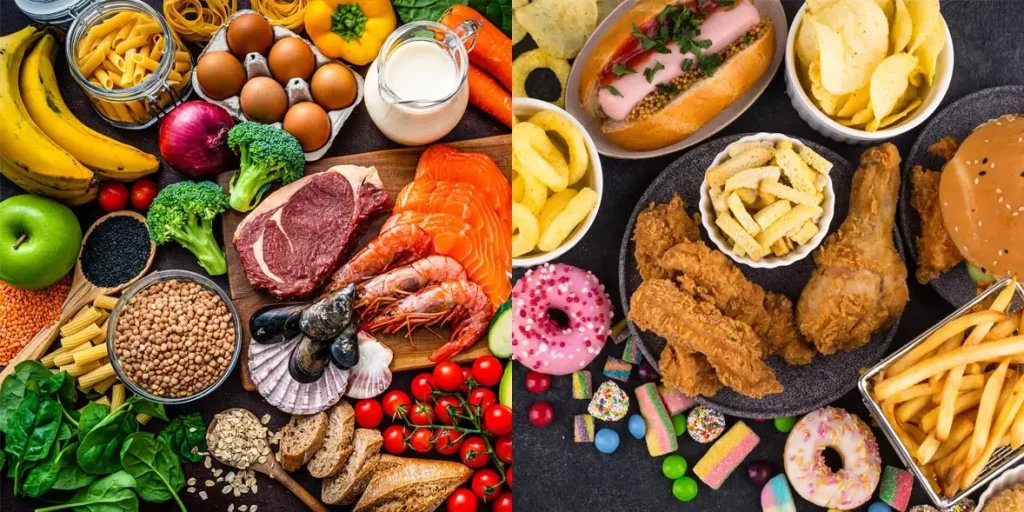List Of Contents
- 1 Understanding the Ingredients and Processing Techniques Used in Ultra-Processed Foods
- 2 Health Risks Associated with Consuming Ultra-Processed Foods
- 3 The Link Between Ultra-Processed Foods and Chronic Diseases
- 4 Impact of Ultra-Processed Foods on Weight Gain and Obesity
- 5 Hidden Additives and Preservatives in Ultra-Processed Foods
- 6 How Ultra-Processed Foods Affect Gut Health and Digestion
- 7 Tips for Reducing Consumption of Ultra-Processed Foods
- 8 Healthy Alternatives to Ultra-Processed Foods
- 9
- 10 Taking Control of Your Diet and Prioritizing Whole, Unprocessed Foods
- 11 Author
Are you aware of the hidden dangers lurking in your favorite ultra-processed foods? In the age of convenience and fast-paced lifestyles, it’s no secret that modern diets heavily rely on these highly processed food choices. However, what many fail to realize is the significant impact these foods can have on our health.
Understanding the Ingredients and Processing Techniques Used in Ultra-Processed Foods
Ultra-processed foods are defined as industrial formulations made from substances derived from foods, such as hydrogenated oils, modified starches, and additives. These foods undergo multiple processing steps to create products that are ready-to-eat or require minimal preparation.
The ingredients used in ultra-processed foods are often low in nutritional value and high in unhealthy additives. Synthetic flavors, colors, and preservatives are commonly added to enhance taste, appearance, and shelf life. Additionally, these foods are typically loaded with refined sugars, unhealthy fats, and high levels of sodium.
The manufacturing processes involved in creating ultra-processed foods often strip them of their natural nutrients while introducing harmful chemicals. High-temperature cooking methods, such as frying and baking, can lead to the formation of acrylamide and other potentially carcinogenic compounds. These processing techniques also destroy essential vitamins and minerals, leaving behind empty calories.

Health Risks Associated with Consuming Ultra-Processed Foods
The consumption of ultra-processed foods has been linked to a range of health risks. One of the most alarming consequences is the increased risk of chronic diseases, including obesity, diabetes, and cardiovascular conditions.
Numerous studies have shown a strong association between the intake of ultra-processed foods and weight gain. These foods are typically high in calories, sugar, and unhealthy fats, making it easy to exceed daily energy requirements. The excessive consumption of these energy-dense foods can lead to weight gain and ultimately contribute to the development of obesity.
Furthermore, ultra-processed foods have a detrimental effect on insulin sensitivity, leading to an increased risk of developing type 2 diabetes. The high sugar content in these products causes rapid spikes in blood sugar levels, putting a strain on the body’s ability to regulate glucose effectively. Over time, this can lead to insulin resistance and the development of diabetes.
The Link Between Ultra-Processed Foods and Chronic Diseases
In addition to obesity and diabetes, the regular consumption of ultra-processed foods has been associated with an increased risk of other chronic diseases. These include cardiovascular diseases, certain types of cancer, and inflammatory conditions.
The excessive intake of refined sugars and unhealthy fats found in ultra-processed foods can lead to elevated blood pressure, elevated cholesterol levels, and the accumulation of visceral fat. These factors contribute to the development of cardiovascular diseases, such as heart disease and stroke.
Furthermore, the additives and preservatives commonly found in ultra-processed foods have been linked to increased inflammation in the body. Chronic inflammation is a key driver in the development of various diseases, including autoimmune disorders, arthritis, and certain types of cancer.
Impact of Ultra-Processed Foods on Weight Gain and Obesity
The high calorie content and low nutritional value of ultra-processed foods make them a significant contributor to weight gain and obesity. These foods are often designed to be hyper-palatable, meaning they are formulated to trigger pleasure centers in the brain and encourage overconsumption.
The combination of high levels of refined sugars, unhealthy fats, and addictive flavorings can lead to cravings and a lack of satiety. This can result in a vicious cycle of overeating, leading to weight gain and difficulty in maintaining a healthy weight.
Moreover, the consumption of ultra-processed foods has been associated with an increased risk of metabolic syndrome. Metabolic syndrome is a cluster of conditions, including high blood pressure, high blood sugar, excess body fat around the waist, and abnormal cholesterol levels. These conditions significantly increase the risk of developing chronic diseases such as heart disease and type 2 diabetes.
One of the biggest concerns with ultra-processed foods is the presence of hidden additives and preservatives. These substances are used to enhance taste, texture, and shelf life, but they can have detrimental effects on our health.
For example, monosodium glutamate (MSG) is a commonly used flavor enhancer found in many ultra-processed foods. While it may enhance the taste of these products, MSG has been linked to adverse reactions in some individuals, including headaches, flushing, and sweating.
Other additives, such as artificial sweeteners, have been associated with negative health effects. Some studies suggest that artificial sweeteners may disrupt the body’s natural ability to regulate calorie intake, potentially leading to weight gain and metabolic disorders.

How Ultra-Processed Foods Affect Gut Health and Digestion
The consumption of ultra-processed foods can have a detrimental effect on gut health and digestion. These foods are often low in fiber, which is essential for maintaining a healthy digestive system.
A lack of dietary fiber can lead to constipation, irregular bowel movements, and an imbalance in the gut microbiota. The gut microbiota plays a crucial role in overall health, affecting immune function, mental health, and even weight management. An unhealthy gut microbiota has been associated with an increased risk of various diseases, including inflammatory bowel disease and obesity.
Additionally, the high levels of additives and preservatives found in ultra-processed foods can disrupt the delicate balance of the gut microbiota, further compromising digestive health.
Tips for Reducing Consumption of Ultra-Processed Foods
The ziatogel is essential for improving overall health and well-being. Here are some practical tips to help you make healthier food choices:
- Prioritize whole, unprocessed foods: Opt for fresh fruits, vegetables, whole grains, and lean proteins. These foods are packed with essential nutrients and are free from harmful additives.
- Cook meals from scratch: Preparing meals at home allows you to have control over the ingredients and cooking methods used.
- Read food labels: Be mindful of the ingredients listed on food labels. Avoid products that contain artificial additives, excessive sugar, and unhealthy fats.
- Plan meals and snacks ahead: Having a meal plan and healthy snacks readily available can help prevent reaching for ultra-processed foods out of convenience.
- Opt for natural sweeteners: Instead of using artificial sweeteners, opt for natural alternatives like honey or maple syrup.
- Stay hydrated: Drinking plenty of water can help curb cravings and promote overall health.
Healthy Alternatives to Ultra-Processed Foods
When it comes to finding healthy alternatives to ultra-processed foods, there are plenty of options available. Here are some ideas to get you started:
- Replace sugary drinks with infused water or herbal teas.
- Snack on fresh fruits, vegetables, and unsalted nuts instead of chips and cookies.
- Choose whole grain bread and pasta instead of refined white varieties.
- Make homemade versions of your favorite condiments and dressings to avoid the added sugars and preservatives found in store-bought versions.
- Experiment with homemade versions of popular processed foods, such as pizza, burgers, and granola bars, using wholesome ingredients.
By making small changes and gradually reducing your reliance on ultra-processed foods, you can improve your overall health and reduce the risks associated with these unhealthy dietary choices.
Taking Control of Your Diet and Prioritizing Whole, Unprocessed Foods
In conclusion, the hidden dangers of ultra-processed foods are becoming increasingly evident. From the high levels of unhealthy additives and preservatives to the detrimental effects on our health, these foods pose significant risks.
It’s essential to understand the ingredients and processing techniques used in ultra-processed foods, as well as the health risks associated with their consumption. By prioritizing whole, unprocessed foods and making conscious choices about what we put into our bodies, we can take control of our diets and improve our overall well-being.
Let’s break free from the allure of convenience and embrace a healthier lifestyle centered around nourishing, wholesome foods. Your health is worth it!
Read also: AEW Revolution 2024: Sting’s Final Stand & Championship Showdowns Light Up Greensboro

